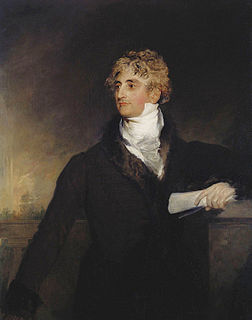
Emmanuel-Armand de Vignerot du Plessis-Richelieu, Duke of d'Aiguillon, was a French soldier and statesman, and a nephew of Armand de Vignerot du Plessis, 3rd Duke of Richelieu. He served as the Secretary of State for Foreign Affairs under King Louis XV.

Armand-Désiré de Vignerot du Plessis-Richelieu, duc d'Aiguillon, was a French military officer and politician.

Armand-Emmanuel Sophie Septimanie de Vignerot du Plessis, 5th Duke of Richelieu and Fronsac, was a prominent French statesman during the Bourbon Restoration. He was known by the courtesy title of Count of Chinon until 1788, then Duke of Fronsac until 1791, when he succeeded his father as Duke of Richelieu.

Louis François Armand de Vignerot du Plessis, duc de Richelieu, was a French soldier, diplomat and statesman. He joined the army and participated in three major wars. He eventually rose to the rank of Marshal of France.
The French title Duc d'Aiguilion may refer to any one of its holders:

The Life Guards was the senior formation of the King of France's Household Cavalry within the Maison militaire du roi de France.

Jean Armand de Maillé, Duke of Fronsac, Marquis of Brézé was a French admiral.

A prince du sang is a person legitimately descended in male line from a sovereign. The female equivalent was princess of the blood, being applied to the daughter of a prince of the blood. The most prominent examples include members of the French royal line, but the term prince of the blood has been used in other families more generally, for example among the British royal family and when referring to the Shinnōke.
PlessisPlessy, and de Plessis are related surnames of French origin, may refer to:
This page is a list of royal governors of Brittany during the Ancien Régime.
Duke of Richelieu was a title of French nobility. It was created on 26 November 1629 for Armand Jean du Plessis de Richelieu who, as a Roman Catholic clergyman, had no issue to pass it down to. It instead passed to his great-nephew, Armand Jean de Vignerot, grandson of his elder sister Françoise du Plessis (1577–1615), who had married René de Vignerot, Seigneur de Pontcourlay.
Armand Jean de Vignerot du Plessis, duc de Richelieu, was a French naval officer and nobleman.
Louis Antoine Sophie de Vignerot du Plessis, 4th Duke of Richelieu, was a French nobleman and general. He was known by the courtesy title of Duke of Fronsac before 1788. He also held the titles of Prince de Mortagne, Marquis du Pont-Courlay, Comte de Cosnac, Baron de Barbezieux, Baron de Coze and Baron de Saugeon.

Claire Clémence de Maillé was a French noblewoman from the Brézé family and a niece of Cardinal Richelieu. She married Louis de Bourbon, Prince of Condé, known as Le Grand Condé, and became the mother of Henri Jules. She was Princess of Condé and Duchess of Fronsac.
Élisabeth Sophie de Lorraine was a French noblewoman and the second wife of Armand de Vignerot du Plessis, the notoriously lecherous Duke of Richelieu.

Urbain de Maillé-Brézé, was a 17th-century French soldier and diplomat, who was a Marshal of France, Ambassador to Sweden in 1632, and Viceroy of Catalonia 1641 to 1642.
Armand de Vignerot du Plessis, duke of Richelieu was a French soldier and statesman.











